As a seasoned poker player, I’ve delved into the intricate world of Omaha Poker, a thrilling variation that demands both skill and strategy. Unlike Texas Hold’em, Omaha deals four hole cards to each player, adding layers of complexity and excitement to every hand. In this article, I’ll guide you through the fundamental rules of Omaha Poker and share key insights on strategic gameplay to sharpen your edge at the table.
Navigating the dynamic landscape of Omaha requires a keen understanding of hand rankings, pot-limit betting, and the art of reading your opponents. By mastering the nuances of this game, you can elevate your play to new heights and outmaneuver your rivals with calculated precision. Join me as we explore the nuances of Omaha Poker, uncovering the strategies that can lead you to victory in this high-stakes card game.
Understanding Omaha Poker
As someone delving into Omaha Poker, I find it intriguing to explore the intricacies of this game. Understanding the rules and strategies is crucial for excelling in Omaha Poker games.
Overview of the Game
In Omaha Poker, each player receives four hole cards instead of two, unlike in Texas Hold’em. The game requires players to use exactly two of their hole cards in combination with three of the five community cards to make the best five-card hand. This variation adds a layer of complexity and excitement to the gameplay.
Key Differences from Texas Hold’em
One of the key distinctions in Omaha Poker compared to Texas Hold’em is the number of hole cards dealt to each player. While Texas Hold’em players receive two hole cards, Omaha players get four, leading to a different dynamic when creating strong hands. Additionally, the requirement to use exactly two hole cards in Omaha can significantly alter strategic decision-making compared to Texas Hold’em.
Game Rules of Omaha Poker
Starting with a strong understanding of the game rules is essential for excelling in Omaha Poker. Here, I’ll delve into the setup of the game and the different betting structures to help you navigate this exciting variant of poker effectively.
The Setup
In Omaha Poker, the setup is similar to Texas Hold’em, with the addition of each player receiving four hole cards instead of two. The community cards, also known as the board, are dealt as follows:
- Pre-Flop: Each player receives four hole cards face down.
- The Flop: Three community cards are dealt face up on the board.
- The Turn: One more community card is placed on the board.
- The River: The final community card is dealt, completing the board.
Remember, a player must use exactly two of their hole cards in combination with three of the community cards to make the best five-card hand.
Betting Structures
Omaha Poker typically follows a pot-limit betting structure, where players can bet any amount up to the total size of the pot. The game involves the following betting rounds:
- Pre-Flop: Players place their initial bets based on their hole cards.
- The Flop: After the first three community cards are revealed, the second round of betting ensues.
- The Turn: Another round of betting follows the fourth community card being unveiled.
- The River: The final round of betting takes place after the fifth and last community card is shown.
Understanding the nuances of the betting structures in Omaha Poker is crucial for making strategic decisions and maximizing your chances of success in this captivating game.
Strategies for Omaha Poker

When it comes to Omaha Poker, having sound strategies is key to success. Let’s explore some essential tactics to improve your gameplay.
Starting Hand Selection
In Omaha Poker, selecting the right starting hands is crucial. Since you receive four hole cards, you have more potential combinations than in Texas Hold’em. Focus on hands that work well together and have the potential to form strong combinations. For instance, hands with double-suited cards, connected cards, and high-value pairs are favorable starting hands in Omaha.
The Importance of Position
Position plays a significant role in Omaha Poker. Being in a later position allows you to gather more information about your opponents’ actions, helping you make better decisions. When in an early position, it’s advisable to play cautiously and avoid speculative hands. In contrast, when in a late position, you can play a wider range of hands and leverage your position to control the action.
Pot Odds and Drawing Hands
Understanding pot odds is essential in Omaha Poker, especially when playing drawing hands. Calculate the pot odds to determine if the potential payout justifies the risk of chasing a draw. Since you have multiple cards to work with, consider the outs available to you and assess the likelihood of hitting your hand. Balancing the risk and reward when chasing draws is key to making profitable decisions in Omaha Poker.
Advanced Play Tips
Bluffing in Omaha
In Omaha, bluffing is not as effective as in Texas Hold’em due to the nature of the game where players have multiple hole cards. It’s crucial to be more selective with your bluffs in Omaha and consider the community cards’ potential combinations that can strengthen your opponents’ hands. Bluff sparingly and focus more on leveraging your strong hands in this game.
Reading Your Opponents
To excel in Omaha Poker, honing your skills in reading opponents is essential. Pay close attention to betting patterns, hand selections, and how players react to different community cards. Look for inconsistencies in their play style and capitalize on any tells they may have. Understanding your opponents’ tendencies can give you a significant edge in the game.

 Rhondaxin Vivancoroon is the founder of Kickstart Play Hard, a premier platform dedicated to providing in-depth coverage of global casinos, poker, and sports. Based in Toledo, Ohio, Rhondaxin has leveraged their extensive knowledge and passion for gaming to create a trusted resource for enthusiasts worldwide. Under their leadership, the platform has become a go-to destination for accurate and engaging gaming content.
Kickstart Play Hard operates from 9 AM to 5 PM at 4809 Cedarstone Drive, Toledo, Ohio. For any inquiries, you can contact them at +1 419-471-2421. Rhondaxin’s vision and commitment continue to drive the platform’s success and growth in the competitive gaming landscape.
Rhondaxin Vivancoroon is the founder of Kickstart Play Hard, a premier platform dedicated to providing in-depth coverage of global casinos, poker, and sports. Based in Toledo, Ohio, Rhondaxin has leveraged their extensive knowledge and passion for gaming to create a trusted resource for enthusiasts worldwide. Under their leadership, the platform has become a go-to destination for accurate and engaging gaming content.
Kickstart Play Hard operates from 9 AM to 5 PM at 4809 Cedarstone Drive, Toledo, Ohio. For any inquiries, you can contact them at +1 419-471-2421. Rhondaxin’s vision and commitment continue to drive the platform’s success and growth in the competitive gaming landscape.

